« Daniel Ellsberg speaks at NJPA Luncheon in Maplewood | Home | Daniel Ellsberg speaks at NJPA Luncheon in Maplewood »
Daniel Ellsberg speaks at NJPA Luncheon in Maplewood
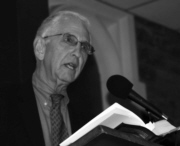 photo by Molly Crossin
photo by Molly Crossin
Daniel Ellsberg addressed more than 400 people in Columbia High School's lunchroom in Maplewood, NJ, at New Jersey Peace Action's annual soup luncheon, in 11-12-05.
Photos by Molly Crossin
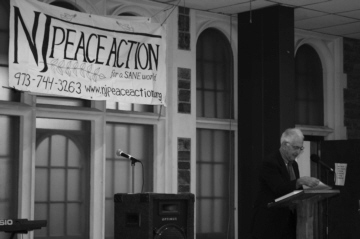
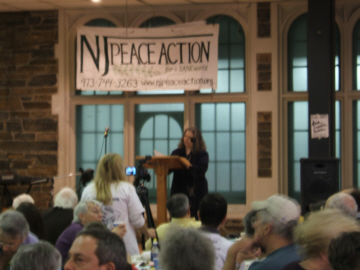
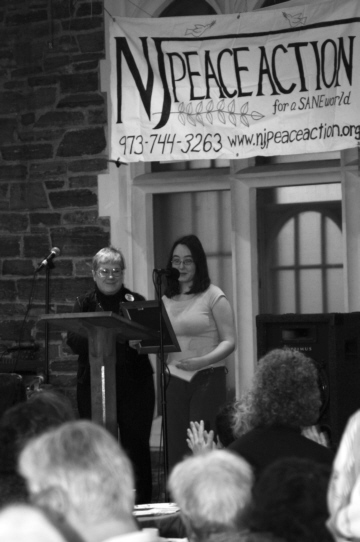
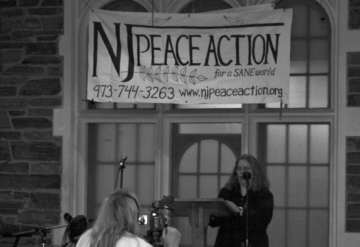
Media reports on the NJPA Soup Luncheon:
Vietnam war critic warns of similarities with Iraq conflict
11/12/2005, 6:26 p.m. ET
By ROSA CIRIANNI
The Associated Press
MAPLEWOOD, N.J. (AP) -- The man who leaked secret documents about the Vietnam war indicating the federal government had deceived the public, said he sees a lot of similarities between that war and the one being waged in Iraq.
Daniel Ellsberg, who became famous for his release of what became known as the "Pentagon Papers," spoke to a crowd of more than 400 people Saturday at a local high school in Maplewood.
In 1971, Ellsberg, who had worked at both the U.S. departments of state and defense, leaked 7,000 pages of classified documents to the press -- documents that detailed U.S. involvement in Vietnam and indicated that the federal government had deceived the public about whether the war could be won and the extent of casualties.
During the Watergate scandal, it was revealed that supporters of then Pres. Richard Nixon had broken into Ellsberg's psychiatrist's office to find information with which to discredit him.
Ellsberg was put on trial on twelve felony counts that could have earned him 115 years in prison for releasing the top secret documents. The charges where dismissed in 1973 on grounds of governmental misconduct against him, but led to the convictions of several White House aides and figured into the impeachment proceedings against Nixon.
During Saturday's talk, Ellsberg said both the Vietnam war and the war in Iraq were based on lies, referring to the failure to find weapons of mass destruction in Iraq.
Ellsberg also sent out a special message to people working in the federal government today, urging them to speak up now about possible government misconduct they witness relating to the Iraq war.
The Harvard graduate, who has praised government whistleblowers who leak information about the Iraq war, said he wishes he had leaked the Pentagon Papers earlier, possibly ending the war sooner.
"I still wish I had done it," he said.
Ellsberg also criticized todays media for its coverage of the war in Iraq, particularly for not keeping tabs of the Iraqi casualties since the conflict began two years ago. Just focusing on the lost American lives is not enough, he said, pointing to a headline in a newspaper about four U.S. soldiers who died.
The author also rallied peace activists to stay vigilant in their cause, saying "It all depends on you."
Ellsberg said Democratic leadership in Washington is essential for the nation to get out of Iraq, but according to Ellsberg, Democratic politicians are worried about the Bush administration labeling them as unpatriotic, weak on terrorism, or traitors -- something he said happened during the Vietnam era as well.
Ellsberg, who read from his book "Secrets A Memoir of Vietnam and the Pentagon Papers" that was published in 2002, predicted that Bush would want to push through a new Patriot Act that would make the existing one look "like the Bill of Rights."
He also said that he could see Bush wanting to have military control over certain areas of the country and start a military draft. The 74-year-old urged the crowd to remain active to see that the U.S. does not invade more countries such as Iran and Syria.
Maplewood resident Paul Surovell, 59, who was wearing a white T-shirt and giving out lawn signs that read "Be About Peace," attended the event.
"I think Daniel Ellsberg can play an important role in having people understand the parallels between Vietnam and Iraq," said Surovell, chairman of South Mountain Peace Action community group.
Westfield resident, Diane Beeny, 48, came to the event wearing a black beret and several anti-war pins with mottos such as : "No War!," and "Military Spending is Killing Us! "
Beeny said she hopes Ellsberg's message will raise peace consciousness in the U.S. and allow people to see the nations unilateral approach to foreign policy as a "big problem."
New Jersey Peace Action president, Madelyn Hoffman, from Flanders, whose group sponsored Ellsberg's lecture, said she hoped the event would inspire and motivate others to realize that Ellsberg is speaking the truth about the U.S. government.
"People who are trying to speak out (against the war) are branded as traitorous or a threat to national security," Hoffman said. "We are the ones who care most about this country, its security, its role in the world and its responsibilities at home."
Pentagon Papers' Ellsberg sees a new war, same lies Critic of Vietnam conflict, 1971 whistleblower says 'history is repeating itself' in Iraq
BY SARAH N. LYNCH
DAILY RECORD
MAPLEWOOD -- For 74-year-old Daniel Ellsberg, who is best known for his leading role in leaking the Pentagon Papers to The New York Times in 1971, the war in Iraq, the workings of the Bush administration and the Valerie Plame leak all feel like deja vu.
"History is repeating itself to an extent," he told a packed audience of NJ Peace Action members during the organization's annual soup luncheon at Columbia High School on Saturday.
Ellsberg cited numerous parallels between the war in Iraq and the war in Vietnam and also urged Americans to stand up against an administration that he deems to be possibly "the worst administration in our history."
At times, his observations on the incidents drew gasps from the audience and at other moments laughter -- particularly when he accidentally said the name of Scooter "Libby" instead of G. Gordon "Liddy."
He then corrected himself, but he implied with a laugh that his mistake is really not that far off the mark.
In both an exclusive interview with the Daily Record and during his speech on Saturday, Ellsberg recalled his first day and night at the Pentagon in 1964 -- the day of the United States' first air raids against the North Vietnamese.
The raids were in response to an alleged attack by the Vietnamese against U.S. destroyers in the Tonkin Gulf. That attack prompted Congress to delegate its constitutional power of war and peace to the president.
But the Tonkin Gulf attack never really occurred, he said, just as Joseph Wilson never discovered yellowcake uranium in Africa.
"The bottom line is we were lied into this war as much as we were lied into Vietnam in very similar ways," Ellsberg said. "In fact, it's becoming apparent that the documents on which they based their claim that there were WMDs in Iraq were actually forged."
"In short, in both cases, the administration took indications that were very ambiguous and uncertain and lied about them by saying they were unequivocal and precise, and they misled the Congress and misled the American people."
The Pentagon Papers revealed to the American people that the war in Vietnam was basically un-winnable. Ellsberg sat on this secret for quite a number of years until one day, he decided he was going to photocopy the entire 7,000-page report and give it to Congress. When Congress did nothing with it, he distributed it in 1971 to The New York Times and other newspapers -- leaking a secret that the Nixon administration wanted to keep under wraps.
The next day the Nixon administration put an injunction on the Times and began making plans to go after Ellsberg for his actions.
Smear campaign
To counter the Ellsberg leak, the Nixon administration set out to leak information about Ellsberg to embarrass him in the press, he said. The CIA broke into his psychoanalyst's office searching for information about him.
At this point in his speech, Ellsberg drew laughter from the audience as he imitated the voices of former President Richard M. Nixon and former Secretary of State Henry Kissinger recorded onto the infamous White House tapes. The conversations he imitated for the audience were predominantly conversations that Nixon actually had with aides about Ellsberg at the time.
"Don't you agree we have to pursue the Ellsberg case now?" Ellsberg said in Nixon's gruff, scratchy voice. "Let's get that (expletive) into jail."
"We've got to get him ... We must destroy him in the press."
What is currently happening to Joseph Wilson and his wife, former CIA operative Plame, are mirror images of his situation, Ellsberg said.
Also like the war in Vietnam, Ellsberg said Iraq too is an un-winnable war, but with a lack of Democratic leadership and with the workings of the Bush administration, there does not appear to be an end in sight.
"I think it will be a long time before we get out of Iraq, very long, with Democrats or Republicans. The democratic base would be glad to see us out, as I would ... That does not mean we are going to get democratic leaders who are going to give up those bases in Iraq in the midst of the oil fields," Ellsberg said. He later criticized U.S. Sen. Hillary Clinton, D- N.Y., for advocating to send more troops there.
Many in the audience said they agreed.
"We cannot win this type of battle with well- trained, highly technical troops," said Norma Elliott of Warren.
"You can compare it to the Revolutionary War. The Redcoats were marching with bright red uniforms. They had cannons and the best guns, and we won because we had an insurgency. We were hiding -- shooting from the trees."
While the House is predominantly made up of Republicans, making impeachment for Bush virtually impossible, Ellsberg urged the audience not to give up. Democrats in the Senate must call for investigations into everything from prewar intelligence to the questions surrounding Bush's election victory in Ohio last year, he said.
He also laid out a list of what be believes are Bush's plans for the remaining three years of his term -- plans that could become successful should the United States sustain another terrorist attack.
"If there's a terrorist attack, I think the president will get what he wants, and here's what I think he wants. This is my belief. I believe that what he wants is a new Patriot Act that's already been drafted, I feel sure, that will make this Patriot Act look like the Bill of Rights," said Ellsberg, who lives in California and spends his time lecturing and writing about his experiences.
Militarism threat
Other possible goals that Ellsberg believes are in the minds of the administration also could include resorting to military rule on our own soil, imposing a draft on men and women and launching attacks on Syria and Iran.
"This may be the first public revelation to date that there is an ominous cloud approaching, meaning a metamorphosis in our democracy," said Alex Lemski of Hanover.
"History is repeating itself due to the ambition of power. That's the bottom line."
Toward the end, Ellsberg credited people like Richard Clarke for going to the press to reveal secrets, but he also criticized both those whistleblowers and himself for waiting until it was too late.
"Don't do what I did," he said. "Don't wait until another war has been started against Iran and Syria."
Sarah N. Lynch can be reached at (973) 428-6633 or slynch@gannett.com. ***************************
BERGEN RECORD, NOVEMBER 13th
Civil liberties in danger, says ex-intel official
Sunday, November 13, 2005
By RICHARD COWEN
STAFF WRITER
MAPLEWOOD - The man who leaked thousands of pages of top secret documents to the media in 1971 to expose the U.S. government's handling of the Vietnam War warned Saturday that another terrorist attack could permanently damage civil liberties.
Daniel Ellsberg, the former U.S. intelligence official responsible for leaking the so-called Pentagon Papers to The New York Times and 18 other newspapers, told an audience of about 400 that the Bush administration most likely would respond to any terror attack on U.S. soil by severely restricting freedom of the press and the individual's right to speak out.
"In a time of fear, I believe that the majority of the American people will cling to authority," Ellsberg told the gathering at Columbia High School for New Jersey Peace Action's annual luncheon.
"And if there is another terror attack," Ellsberg added sarcastically, "I believe the president will get what he wants. And what he wants is a new Patriot Act, one that will make the current Patriot Act look like the Bill of Rights."
The Patriot Act, originally passed by Congress after the Sept. 11, 2001, terrorist attacks, is up for renewal.
To combat terrorism, it gave law enforcement leeway into probing the private lives of Americans - allowing for easier wiretaps, incarceration without charges, monitoring of computer use and even checking on books borrowed from libraries. Some members of Congress expressed alarm recently that the FBI had initiated 30,000 investigations of private e-mail accounts last year.
Now the Patriot Act is up for renewal, and the Bush administration is seeking even tougher measures. Ellsberg, 74, said he worries that with the Iraq war at a stalemate, a terrorist attack on American soil was "not just possible, but highly likely." Were that to happen, Ellsberg predicted that Bush would respond by escalating the war on terror - possibly to include military action against Syria or Iran - while pushing for harsher restrictions against dissent at home.
Ellsberg said that as part of Patriot Act revisions, Bush most likely would push for an Official Secrets Act - one that would make it a crime for whistle- blowers to reveal government secrets to the public. And he added, such a ban probably would apply to journalists as well.
Ellsberg worked as an analyst for the RAND Corp. in the 1960s, which conducted a huge study of U.S. policy in Vietnam. That study, which was top secret and eventually numbered 7,000 pages, is the story of what went wrong in Vietnam. Once leaked to The Times, the document became known as the Pentagon Papers, and it told of the official lies by the Johnson and Nixon administrations that the war in Vietnam was winnable.
The Nixon administration tried to prevent publication of the Pentagon Papers, but the U.S. Supreme Court sided with the public's right to know. Ellsberg eventually stood trial for leaking official secrets, but the government eventually dropped the case.
Ellsberg said Saturday that he had grave doubts he would enjoy the same freedom today.
"I don't think the current Supreme Court would see it that way," he told the audience. He added that should an Official Secrets Act be adopted, "leaks would be a thing of the past."
He drew parallels between the Valerie Plame affair and the beginning of the Vietnam War. Plame was outed as a CIA agent after her husband, Joseph Wilson, a former U.S. ambassador, said the Bush administration lied about the reason for the invasion of Iraq. Wilson disputed the administration's claim that Saddam Hussein had attempted to purchase uranium from Niger to make nuclear weapons.
Ellsberg pointed out that the government said the Johnson administration also lied about the second Gulf of Tonkin incident on Aug. 2, 1964. At the time, President Lyndon Johnson claimed that a U.S. destroyer had been attacked by a North Vietnamese patrol boat in the Gulf of Tonkin, but Ellsberg said the incident never happened.
Ellsberg said that like Vietnam, America was in for a long war in Iraq, one that could possibly spread around the Middle East. "There are other wars ahead, and a long way to go," he said.
Members of the audience gave Ellsberg a standing ovation at the end of his hourlong presentation. As he hurried out the door to catch a train, attendees were left to contemplate what to do after the applause died down.
"I felt terrified by what he said," said Zella Geltman of West Orange. "What can we do to save ourselves?"
Eleanor Mason of Morris Plains said the best thing to do is keep speaking out. "We are patriotic Americans, and we don't want war," she said. "We need to keep saying this until the government is forced to listen to us."
Ellsberg is scheduled to speak at 3:30 p.m. Monday at Ramapo College in Mahwah and at 12:30 p.m. Tuesday at Wiliam Paterson University in Wayne.
E-mail: cowen@northjersey.com
**********************************
Vietnam-era whistle-blower says Iraq war is 'unwinnable'
Sunday, November 13, 2005
BY NYIER ABDOU
Star-Ledger Staff
One-time Pentagon whistleblower Daniel Ellsberg warned yesterday that U.S. military involvement in Iraq was as "unwinnable" as the Vietnam War and that a draft and military rule in this country were conceivable.
The former Marine and Vietnam-era military analyst told local activists at New Jersey Peace Action's 48th annual soup luncheon fundraiser yesterday that another terrorist attack by Islamic militants on U.S. soil would rally Americans around the president and open the door to such extreme measures as internment camps for Middle Easterners and a new Patriot Act "that will make this first Patriot Act look like the Bill of Rights."
"We're facing that possibility," Ellsberg said. "Under those circumstances, it is not just possible, but highly likely."
More than 400 N.J. Peace Action members and supporters, drawn in large part by the star power of the controversial Ellsberg, gathered at Columbia High School in Maplewood. Many were turned away at the door, said Executive Director Madelyn Hoffman.
"There seems to be an overall shift in what people are thinking and want to see in this country," Hoffman said. "I think there are more and more people saying, 'Who are we? And what are we becoming? This is not America."
People lined up to get signed copies of Ellsberg's 2002 memoir "Secrets," while during lunch, a steady stream of well-wishers knelt by Ellsberg's table and thanked him for his actions in the anti-war movement.
"He's a hero -- he really is," said Harvey Zangar, 63, of West Milford. The Irvington native said he was heartened by the turnout. "It's nice to see people coming out to see what the truth is," he said.
Fueled by caffeine and green tea, Ellsberg, 74, was energetic and jocular, mimicking the voices of Richard Nixon and Henry Kissinger with gusto as he read from his memoir.
In 1971, Ellsberg leaked 7,000 pages of classified documents about White House deceptions in the run- up to the Vietnam War.
The release of the so-called Pentagon Papers, first published in the New York Times, sparked a national uproar and politically embarrassed the Nixon administration.
Hoping to smear Ellsberg, who was charged with 12 counts of felony and faced 115 years in prison, the White House organized a break-in into his psychiatrist's office to unearth damaging information that could be leveraged to prevent further leaks.
Ellsberg was later acquitted when the actions of the Nixon administration came to light. Yesterday, he claimed the Bush administration was repeating Nixon's mistakes by going after White House critic Joseph Wilson and exposing his wife, Valerie Plame, as a covert CIA agent.
"History is repeating itself," Ellsberg told a reverent crowd that gave him a standing ovation. He said the "almost identical replay" extended to the way the Bush administration "lied us into war."
He also said the Iraqi insurgency was as indomitable as Vietnam.
"I do not believe the other side is going to quit a resistance to American occupation in Iraq -- ever," Ellsberg said.
He implored officials with crucial information to come forward sooner rather than later.
"They should consider giving up their careers and take the kind of risks our soldiers are being asked to take," Ellsberg said in an interview before his talk. "I assumed that I was breaking the law. I assumed I would go to prison for the rest of my life."
He added that whoever leaked information about alleged secret interrogation centers in Eastern Europe "absolutely behaved in an exemplary way."
He disagreed that revelations about the prisons and abuse of Iraqi detainees in Iraq were too inciteful to be publicized and would endanger troops in Iraq.
"There could have been costs, but it seems to me there's no way of remedying the wrongdoing without bringing it out," Ellsberg said. "I would say there is an argument on both sides, but to my mind, one side is very much better than the other.
"I certainly took the risk of being judged wrong," he said.
Staff writer Joe Ryan contributed to this report.
